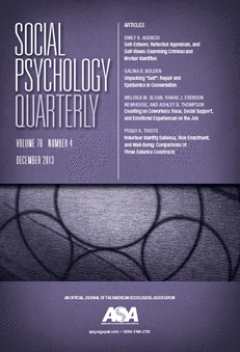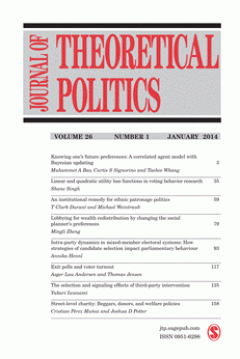Filter by
Found 12368 from your keywords: subject="Wets and Dries Resurg...

Small Group Research, Volume 44, Number 1, February 2013
- Edition
- -
- ISBN/ISSN
- 1046-4964
- Collation
- -
- Series Title
- -
- Call Number
- -
- Edition
- -
- ISBN/ISSN
- 1046-4964
- Collation
- -
- Series Title
- -
- Call Number
- -

Media Culture & Society, Volume 35, Number 7, October 2013
- Edition
- -
- ISBN/ISSN
- 0163-4437
- Collation
- -
- Series Title
- -
- Call Number
- -
- Edition
- -
- ISBN/ISSN
- 0163-4437
- Collation
- -
- Series Title
- -
- Call Number
- -

Media Culture & Society, Volume 35, Number 6, September 2013
- Edition
- -
- ISBN/ISSN
- 0163-4437
- Collation
- -
- Series Title
- -
- Call Number
- -
- Edition
- -
- ISBN/ISSN
- 0163-4437
- Collation
- -
- Series Title
- -
- Call Number
- -

Media Culture & Society, Volume 35, Number 5, July 2013
- Edition
- -
- ISBN/ISSN
- 0163-4437
- Collation
- -
- Series Title
- -
- Call Number
- -
- Edition
- -
- ISBN/ISSN
- 0163-4437
- Collation
- -
- Series Title
- -
- Call Number
- -

Media Culture & Society, Volume 35, Number 4, May 2013
- Edition
- -
- ISBN/ISSN
- 0163-4437
- Collation
- -
- Series Title
- -
- Call Number
- -
- Edition
- -
- ISBN/ISSN
- 0163-4437
- Collation
- -
- Series Title
- -
- Call Number
- -

Media Culture & Society, Volume 35, Number 3, April 2013
- Edition
- -
- ISBN/ISSN
- 0163-4437
- Collation
- -
- Series Title
- -
- Call Number
- -
- Edition
- -
- ISBN/ISSN
- 0163-4437
- Collation
- -
- Series Title
- -
- Call Number
- -

Gender & Society, Volume 27, Number 3, June 2013
- Edition
- -
- ISBN/ISSN
- 0891-2432
- Collation
- -
- Series Title
- -
- Call Number
- -
- Edition
- -
- ISBN/ISSN
- 0891-2432
- Collation
- -
- Series Title
- -
- Call Number
- -

Gender & Society, Volume 27, Number 4, August 2013
- Edition
- -
- ISBN/ISSN
- 0891-2432
- Collation
- -
- Series Title
- -
- Call Number
- -
- Edition
- -
- ISBN/ISSN
- 0891-2432
- Collation
- -
- Series Title
- -
- Call Number
- -

Social Psychology Quarterly, Volume 76, Number 4, December 2013
- Edition
- -
- ISBN/ISSN
- 0190-2725
- Collation
- -
- Series Title
- -
- Call Number
- -
- Edition
- -
- ISBN/ISSN
- 0190-2725
- Collation
- -
- Series Title
- -
- Call Number
- -

Social Psychology Quarterly, Volume 76, Number 1, March 2013
- Edition
- -
- ISBN/ISSN
- 0190-2725
- Collation
- -
- Series Title
- -
- Call Number
- -
- Edition
- -
- ISBN/ISSN
- 0190-2725
- Collation
- -
- Series Title
- -
- Call Number
- -

Social Psychology Quarterly, Volume 76, Number 2, June 2013
- Edition
- -
- ISBN/ISSN
- 0190-2725
- Collation
- -
- Series Title
- -
- Call Number
- -
- Edition
- -
- ISBN/ISSN
- 0190-2725
- Collation
- -
- Series Title
- -
- Call Number
- -

Social Psychology Quarterly, Volume 76, Number 3, September 2013
- Edition
- -
- ISBN/ISSN
- 0190-2725
- Collation
- -
- Series Title
- -
- Call Number
- -
- Edition
- -
- ISBN/ISSN
- 0190-2725
- Collation
- -
- Series Title
- -
- Call Number
- -

Journal of Theoretical Politics, Volume 25, Number 3, July 2013
- Edition
- -
- ISBN/ISSN
- 0951-6298
- Collation
- -
- Series Title
- -
- Call Number
- -
- Edition
- -
- ISBN/ISSN
- 0951-6298
- Collation
- -
- Series Title
- -
- Call Number
- -

Gender & Society, Volume 27, Number 1, February 2013
- Edition
- -
- ISBN/ISSN
- 0891-2432
- Collation
- -
- Series Title
- -
- Call Number
- -
- Edition
- -
- ISBN/ISSN
- 0891-2432
- Collation
- -
- Series Title
- -
- Call Number
- -

Gender & Society, Volume 27, Number 5, October 2013
- Edition
- -
- ISBN/ISSN
- 0891-2432
- Collation
- -
- Series Title
- -
- Call Number
- -
- Edition
- -
- ISBN/ISSN
- 0891-2432
- Collation
- -
- Series Title
- -
- Call Number
- -

Gender & Society, Volume 27, Number 2, April 2013
- Edition
- -
- ISBN/ISSN
- 0891-2432
- Collation
- -
- Series Title
- -
- Call Number
- -
- Edition
- -
- ISBN/ISSN
- 0891-2432
- Collation
- -
- Series Title
- -
- Call Number
- -

Gender & Society, Volume 27, Number 3, June 2013
- Edition
- -
- ISBN/ISSN
- 0891-2432
- Collation
- -
- Series Title
- -
- Call Number
- -
- Edition
- -
- ISBN/ISSN
- 0891-2432
- Collation
- -
- Series Title
- -
- Call Number
- -

Comparative Political Studies, Volume 46, Number 12, December 2013
- Edition
- -
- ISBN/ISSN
- 0010-4140
- Collation
- -
- Series Title
- -
- Call Number
- -
- Edition
- -
- ISBN/ISSN
- 0010-4140
- Collation
- -
- Series Title
- -
- Call Number
- -

Comparative Political Studies, Volume 46, Number 11, November 2013
- Edition
- -
- ISBN/ISSN
- 0010-4140
- Collation
- -
- Series Title
- -
- Call Number
- -
- Edition
- -
- ISBN/ISSN
- 0010-4140
- Collation
- -
- Series Title
- -
- Call Number
- -

Comparative Political Studies, Volume 46, Number 10, October 2013
- Edition
- -
- ISBN/ISSN
- 0010-4140
- Collation
- -
- Series Title
- -
- Call Number
- -
- Edition
- -
- ISBN/ISSN
- 0010-4140
- Collation
- -
- Series Title
- -
- Call Number
- -
 Computer Science, Information & General Works
Computer Science, Information & General Works  Philosophy & Psychology
Philosophy & Psychology  Religion
Religion  Social Sciences
Social Sciences  Language
Language  Pure Science
Pure Science  Applied Sciences
Applied Sciences  Art & Recreation
Art & Recreation  Literature
Literature  History & Geography
History & Geography